Okere administration impeachment petition circulates on campus, SGA president responds
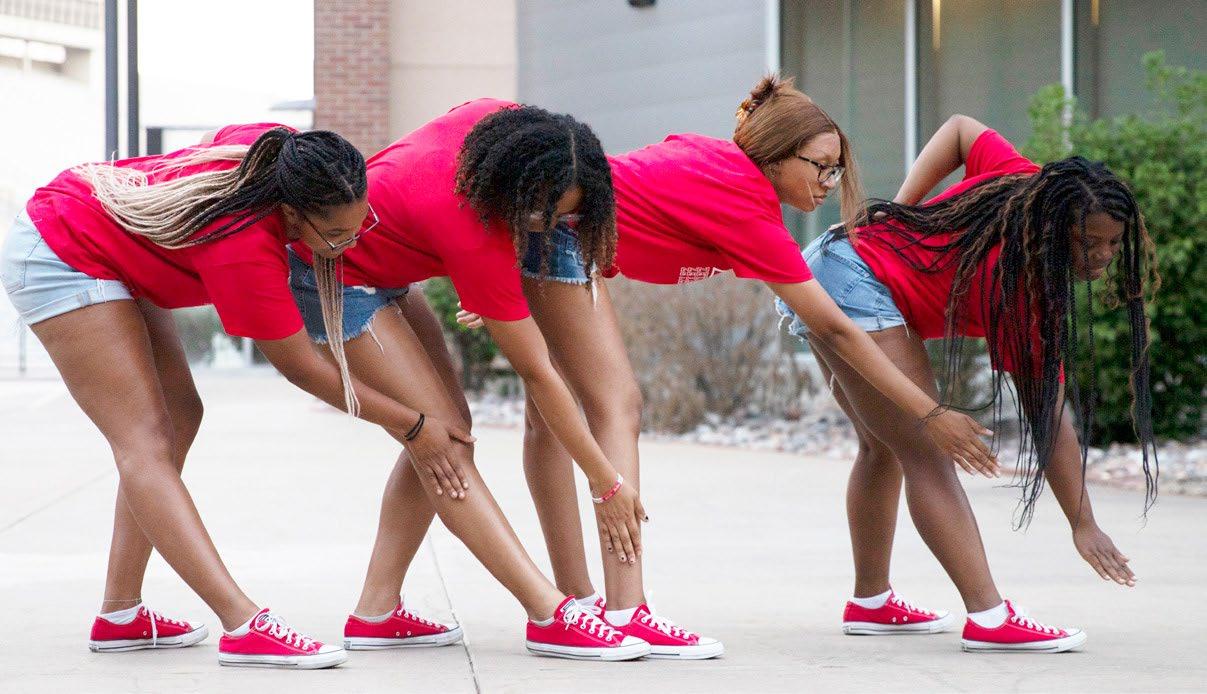 BY COURTNEY BROWN newsprojects@thesunflower.com
BY COURTNEY BROWN newsprojects@thesunflower.com
Less than a week after a former Student Government Association senator asked the president and vice president to resign, posters appeared in various buildings around campus on Tuesday, calling for the Okere administration’s impeachment.
Vishnu Avva, a former at-large senator, spoke at the Student Government Association (SGA) meeting last Wednesday, calling for the resignation of Student Body President Iris Okere and Vice President Sophie Martins. He spoke on the need to address “corruption happening behind the scenes by the student body president.”
Avva said he was denied an interview after applying to be the legislative and policy affairs director under the Okere administration, which he said impacts Okere’s ability to determine who is most qualified
for the role.
Avva also said that many others, including six members of the president’s cabinet, did not apply for their nominated positions and were held to a different standard than other applicants.
The posters stating “Impeach the Okere Administration” echo Avva’s sentiments, listing the following reasons the administration should be impeached:
• “for corruption & defrauding of the student body”
• “violating their oath of office and the constitution of the Student Government”
• “hiring friends and romantic partners who are paid with tens of thousands of dollars of your student fee money.”
Another version of the posters states that “the Okere administration should resign,” listing the same reasons as above. Both versions of posters also feature a QR code, where students can sign a petition to impeach
Okere and share their reasons for doing so.
In May, there were concerns about Okere appointing Martins’ partner Kyan Caudillo to the position of director of health and wellness. According to Gabriel Fonseca, who helps advise SGA, all leadership positions that hold office hours are compensated by the association.
On Tuesday, Avva posted on the Wichita State Class of 2024’s public Snapchat a picture of one of the impeachment posters hanging in Lindquist. In a message to The Sunflower, Avva said he did not create posters or petitions, but he
thought they were “awesome” and decided to share them.
“When you’re defrauding the student body by going against the rules of SGA, you need to be held accountable,” Avva said. “Choosing your friends for positions they never even applied for is disgusting,” Avva said.”These illegitimate appointments are making decisions that affect the student body, and they should be stopped.”
At the SGA meeting on Aug. 30, Okere left shortly after Avva’s call for her resignation, and Martins didn’t comment, stating that she and Okere needed to meet with Amy Nguyen, their public relations director.
RESPONSE FROM OKERE
Okere responded to the calls for her impeachment at the State of the Student Body, calling them “accusations of falsehoods” and “manipulation by disgruntled individuals.” She said she initially
GOING FOR A STROLL
didn’t want to respond and “give attention to the political and nasty games that people wanted to play in my name.”
“(The accusations are) based on false information created by individuals who believe that they know what is best,” Okere said. “They’re painting a picture of someone that I’m not.”
Okere said she stands by every decision she has made, stating they were all “thoughtful and honest,” and that she will not stand for attacks on her character.
“For far too long, this negative dark cloud was surrounding SGA because vulgar disagreements are because of deceptions that have been made up by people,” Okere said.
Okere said she does not plan to spend any more time responding to the allegations and will continue to serve the student body.
“I represent 70,000 Shockers, and a few will not deter me from accomplishing the commitment,” Okere said.

Student body president addresses organizations’ budget cuts, announces upcoming projects
BY COURTNEY BROWN newsprojects@thesunflower.com
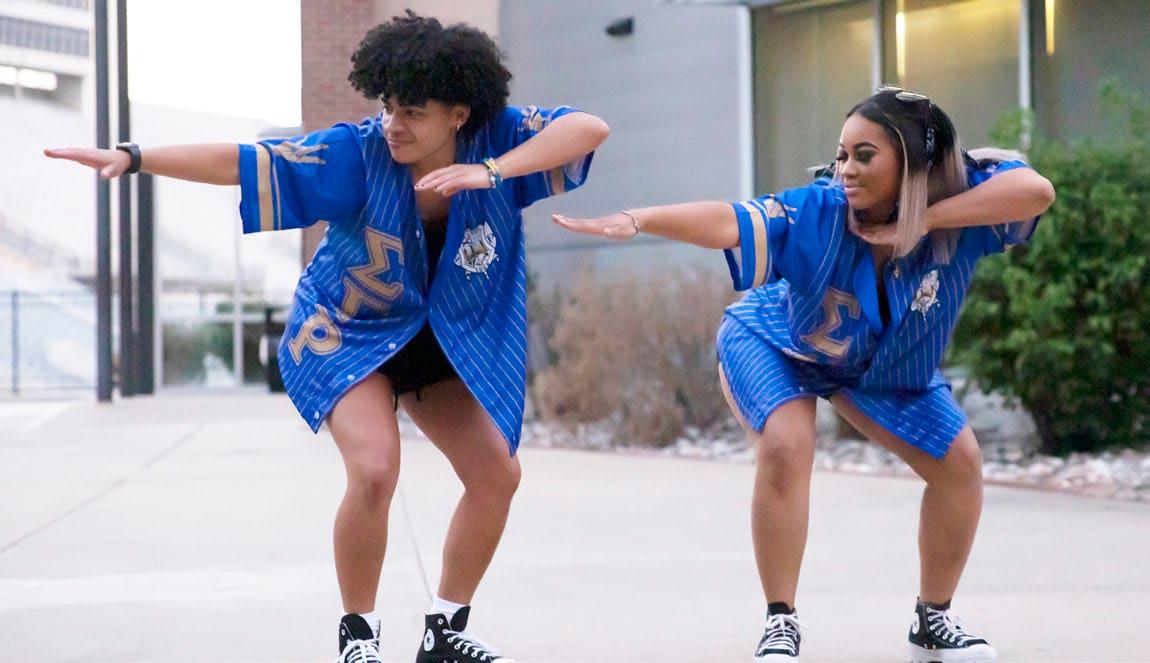
Leaders in the Student Government Association (SGA) discussed their goals and priorities for this academic year at the State of the Student Body on Wednesday evening.
Student Body President Iris Okere touched on how the funding committee allocated funding to recognized student organizations. Out of the requested total of $722,000, SGA could originally only allocate $165,000; $15,000 was later added from SGA’s reserves, for a total of $180,000.
The funding committee underwent three rounds of assigning appropriations. Several organizations spoke at the SGA meeting on Aug. 23 to share how their severe funding cuts would impact them, with some stating their organizations were at risk.
The organizations in the College of Engineering said that the college provides them space but no funding.
“This is a call for help from the college deans to contribute to the success of these imperative organizations under their stature,” Okere said.
During the third round on Aug. 30, the Indian Student Association had the largest budget cut, which was originally allocated $10,000 but was reduced to $6,900. Four other organizations lost over $2,000. According to Okere, 13 underserved groups were defunded between the second and third rounds “to support larger initiatives.”
Okere announced the Appropriations Relief Act, her newly authored funding bill, which would request $33,000 from SGA’s contingency fund to help alleviate the affected organizations’ budget cuts and raise the funding back to “the initial allocation from round one of the process.”
“I was and continue to be very disappointed with the appropriations allocations. It doesn’t sit right with me,” Okere said. “Several of these organizations tend to always get looked past.”
Okere called on the Senate to swiftly pass the bill and issued an order for the Student Senate to meet on Sept. 12 at 6 p.m. to discuss the bill.
Read the rest at thesunflower.com
WICHITA STATE UNIVERSITY’S STUDENT NEWS SOURCE SINCE 1896 www.thesunflower.com Sept. 7, 2023 Volume 128 Issue 3
VISHNU AVVA Former at-large SGA senator These illegitimate appointments are making decisions that affect the student body, and they should be stopped. “
Members of Delta Sigma Theta show off their skills at the National PanHellenic Council Yard Show. Tamia Trotter and
their
at the National
Hellenic
Jayden Johnson strolls with a smile at the National Pan-Hellenic Council Yard Show on Aug. 31. Johnson serves as the Alpha Phi Alpha Fraternity vice president at Wichita State. | Photos by Jocelynn Cavender / The Sunflower
Ananda Smith show
skills
Pan-
Council Yard Show. The two were a part of the Sigma Gamma Rho sorority.
The National Pan-Hellenic Council showed off their organizations at the Yard Show on Aug. 31. The event was meant to showcase “talent, history, and tradition.”
Student Senate revises student orgs funding budget once again
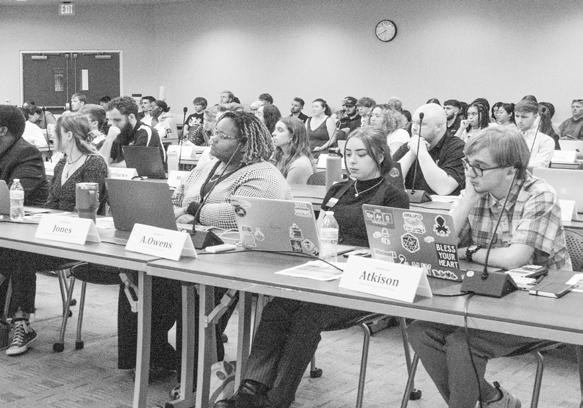 BY TRINITY RAMM managing@thesunflower.com
BY TRINITY RAMM managing@thesunflower.com
Film explores racial tensions and trauma surrounding 1965 plane crash
BY CHEYANNE TULL earth2chey.info@gmail.com
Not far from Wichita State University on Jan. 16, 1965, a U.S. Air Force Boeing KC-135 crashed into a primarily Black community in northeastern Wichita. 23 were killed on the ground along with the seven crew members on the plane. Kevin Harrison created a film documenting this tragedy on 20th and Piatt, titled “The Silent Cries of Unheard Ghetto Children.”
Harrison, assistant teaching professor and director of diversity, equity and inclusion in the Cohen Honors College, made the film in about seven months alongside Ricardo Harris, pastor and executive director of Wichita GEAR UP, and independent producer Kenneth Hawkins. The film focuses on racial tensions and trauma that prevents the impacted community from healing.
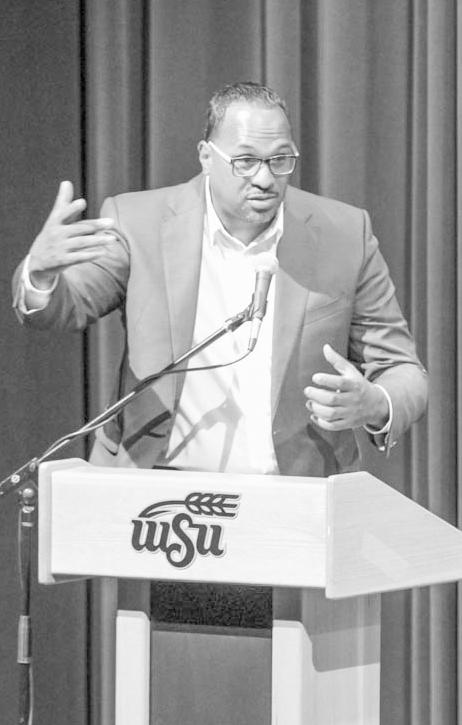
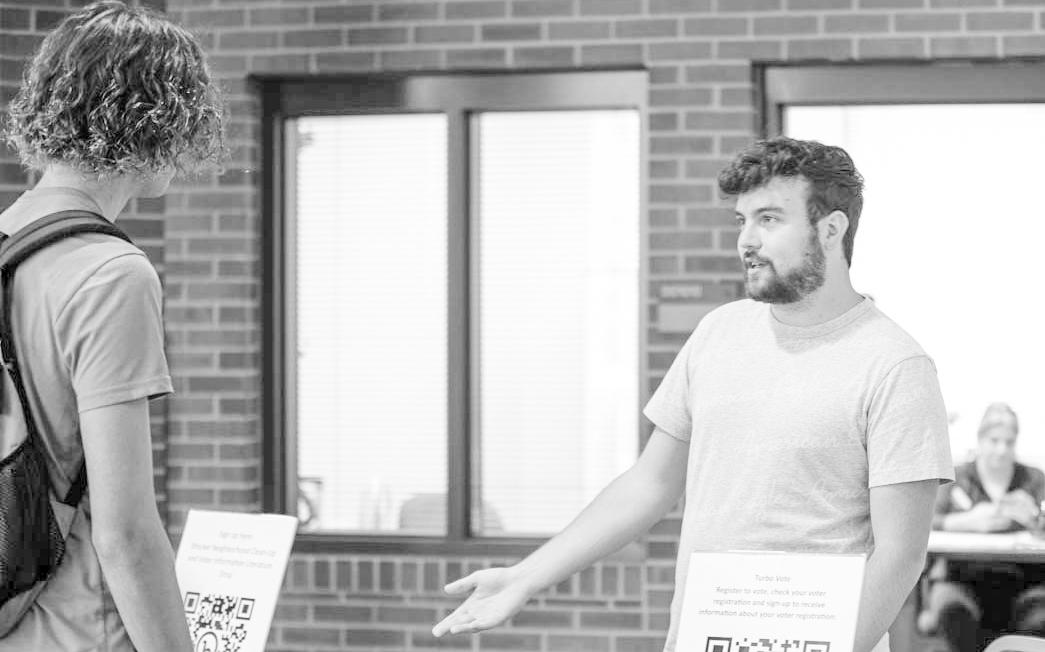
“We thought maybe this film would give some voices an opportunity to be heard that were never heard for almost 60 years,” Harrison said. “Maybe there’s still some trauma and maybe creating a film like this may allow some of these individuals to address some of that trauma.”
The film “The Silent Cries of Unheard Ghetto Children” premiered at the memorial site of the plane crash at Piatt Park, close to where the tragedy happened. The film has been shown five times since, including the CAC theater
BY ALLISON CAMPBELL news@thesunflower.com
Less than one in three eligible Kansas voters exercised their right to vote for local, statewide and national representatives and policies during the last presidential election cycle. Due to voter apathy and fatigue, the statistic is even lower for Kansas youth. Shocker Vote Coalition, in collaboration with SGA Government Oversight Chairperson Jay Thompson, is working to change that by providing Wichita State students with the tools and information to register to vote.
The Shocker Vote coalition is an organization of WSU students, faculty and staff that hosts several annual events to engage underserved populations, firsttime voters and those who don’t regularly participate in elections. Through public events, such as the Voter Registration Drive hosted at
MISSION
on Aug. 31.
“I was interested in coming to this film because it shows the history of a Black neighborhood in Wichita,” freshman marketing major May Smith said. “Coming here to a campus where I was pulled for diversity and inclusion, interested me to learn more about the culture here, as far as the Black community.”
The film’s title, “The Silent Cries of Unborn Ghetto Children,” has a dual meaning, according to Harrison.
He said the first meaning refers to the deaths of pregnant 25-year-old Laverne Warmsley, her unborn child, Warmsley’s husband, and their three children, who were all engulfed in flames during the plane crash.
Another pregnant woman 53 yards away, Sandra Walls, survived along with her baby, Marsha Walls, on the day of the plane crash.
The second meaning questions the use of the word “ghetto.” While it is often used to describe run-down, poverty-stricken, “crime-infested” areas inhabited mostly by minorities, the film argued that it has a deeper meaning of love, community and family.
“The Silent Cries of Unheard Ghetto Children” also notes the phrase, “Where is the Love?” toward the end of the film, which portrays how Wichita deprived this Black community of love and care in their time of need.
According to the film, issues
Shocker Hall on Sept. 5, volunteers show students how to register to vote and how to check their voting status.
“I think it’s important for students to register to vote because this block of voters is significantly less represented at the national and state level than any other age group or any other demographic,” Thompson said. “And historically, young people are not found to vote in high numbers.”
Ahead of the next Wichita mayoral election, many young voters are struggling to get engaged in local politics. According to KMUW, only 3% of eligible Sedgwick County voters between the ages of 18 and 29 turned out for the last election. Many attribute low youth voting rates to an increase in voter apathy, a perception that the Shocker Vote Coalition is hoping to change.
“It’s just one student at a
The Sunflower — both in print and online — will be a timely resource of information about the Wichita State University community. It will report on news, issues, activities, academics and athletics, in addition to offering a forum for discussion, reviews and commentary. It will also be an effective learning experience for students, who will have the final authority over what is published.
LEGAL

One free copy of The Sunflower is available to members of the WSU community. Additional copies may be obtained from the newsroom, Elliott Hall 019. The Sunflower is private property and unlawful removal or use of papers is prosecutable. The Sunflower is funded by a combination of print and online advertisement sales and student fees allocated by the Student Government Association.
The Sunflower is a member of the Associated Collegiate Press, College Media Association and the Wichita Journalism Collaborative.
Copyright © 2023 The Sunflower. This newspaper, its design and its contents are copyrighted.
during the 1960s ranged from racial segregation, environmental racism and not being treated as human, which the Black community and gentrified communities still experience.
Before and after the 1965 plane crash, Wichita was as segregated as any city in the south. Each city included a predominantly Black community, usually poverty stricken and not being given the same opportunities as white people.
Segregation factored into the Black community not receiving proper care to recover from the plane crash. Boeing did not provide compensation to the families that suffered loss. In addition, the survivors without insurance were
unable to get aid in rebuilding their homes, and some were worse off in poor financial situations.
“It makes it easier to overcome the trauma if you are being supported in all kinds of ways, including monetarily,” Debbie Gordon, assistant professor in the Women’s Ethnicity and Intersectional Studies department, said.
Regarding the environmental concern around the jet fuel pollution in the affected neighborhood’s water, Gordon said “someone should have come in and cleaned all that up.”
Redlining also occurred in 1965. Redlining is the discriminatory practice of minimizing resources in a certain area, such as health and wellness being more difficult to access. Wealthier white communities who lived outside of the area’s margins were able to get mortgages and pursue the American Dream: life, liberty, and the pursuit of happiness.
The panelists open for discussion after the documentary were survivor Victor Daniels, Lavonta Williams, educator, survivor, and first Black woman elected as Vice Mayor for Wichita, senior animation student Nalah Monet Stokes, and licensed therapist and Friends University graduate Gabrielle Jones.
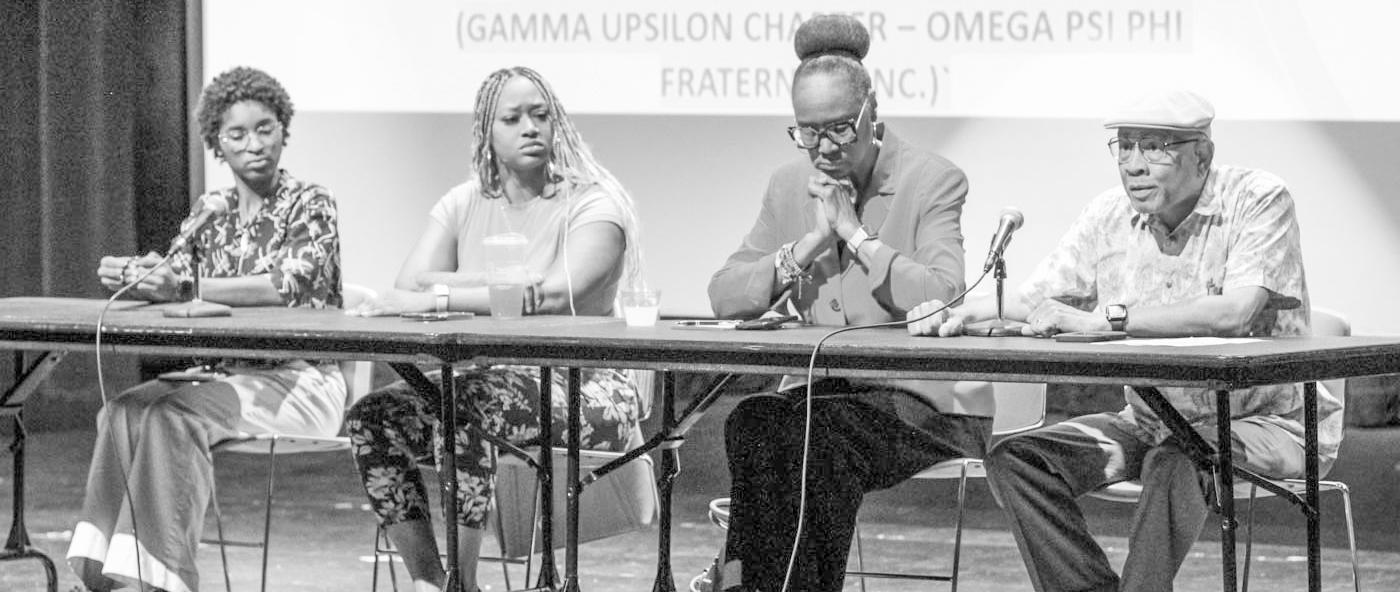
In response to the community that has bottled up their feelings around this tragic day, Harrison said, “It’s okay to be in pain. What human wouldn’t be in pain from something that disastrous?”
The Student Senate decided to redo allocations yet again during Aug. 30’s Senate meeting, going through the budget line-by-line and approving or amending each organization’s allotted amount.
According to Aaron Haynes, the chairperson who made the initial motion to divide the bill, the decision was due to worries over conflicts of interest. If they voted on each individual organization rather than voting on the bill in its entirety, senators could abstain from organizations that they participate in.
Indian Student Association took the biggest hit throughout the entire process. They were originally allocated $10,000 under the voided appropriations budget and now sit at $6,900 after the Aug. 30 meeting.
Four other groups lost over $2,000 from the original appropriations process: Sigma Lambda Beta International Fraternity Inc., Association of Hindu Students in America, Delta Sigma Theta and Alpha Phi Alpha Fraternity, Inc.
Both Shocker Racing: Baja SAE and Shocker Racing: Formula SAE saw the biggest variances between their original allocations and what they will likely receive for this fiscal year.
Baja SAE will receive $18,270 from SGA, a $13,270 difference from what they were allocated at the beginning of August. Formula SAE will receive $19,260, which is $15,760 gained from their initial allocation. These appropriations are not final and will provide the basis for the 74 bills that are currently being processed by the Student Government Leadership, according to SGA adviser Brandon McClain.
The full, uncodified appropriations budget can be found on thesunflower.com.
New Dean of Libraries announced
BY ALLISON CAMPBELL news@thesunflower.com
After almost a month of deliberation, Brent Mai has been named as the newest dean of University Libraries, including Wichita State’s Ablah Library, McKinley Chemistry Library and the Thurlow Lieurance Memorial Music Library.
A Kansas native, Mai is the former dean of the Thomas G. Carpenter Library at the University of North Florida. Effective Oct. 15, Mai will assume the roles formerly held by Kathy Downes, who retired earlier this month.
time,” Thompson said. “I think it’s important that students know what’s available to them and especially know that their voice does matter in the process ... Having someone on the ground telling them that can sometimes mean a lot for individuals.”
The Shocker Vote Coalition
meets every other Wednesday starting on Sept. 6 in room 216 of the Rhatigan Student Center at 12 p.m. Students, faculty and staff are invited to attend meetings to learn more about the organization and how to become a better engaged voter at the local and national level.
The Sunflower, founded in 1896, is the student-run newspaper covering Wichita State University. The print edition is published Thursday during the fall and spring semesters. The staff publishes daily online at www.thesunflower.com.
EDITOR IN CHIEF Mia Hennen editor@thesunflower.com
ADVERTISING/DESIGN MANAGER Thy Vo admanager@thesunflower.com
MANAGING EDITOR Trinity Ramm managing@thesunflower.com
INVESTIGATIVE NEWS EDITOR Courtney Brown newsprojects@thesunflower.com NEWS EDITOR Allison Campbell news@thesunflower.com
ARTS & CULTURE EDITOR Salsabila Attaria arts@thesunflower.com
SPORTS EDITOR Melanie Rivera-Cortez sports@thesunflower.com
OPINION EDITOR Sascha Harvey opinion@thesunflower.com
PHOTO EDITOR Kristy Mace photo@thesunflower.com
PODCAST EDITOR Jacinda Hall podcast@thesunflower.com
"I'm looking forward to leading the outstanding faculty and staff of the Ablah Library as it continues to strengthen the opportunities for academic success among WSU's students and faculty through teaching and learning, research and scholarship," Mai said.
CONTACT US
019 Elliott Hall 1845 N. Fairmount Ave. Campus Box 134 Wichita, KS 67260-0134
EDITORIAL Mia Hennen: 316-978-6906 editor@thesunflower.com
ADVERTISING Thy Vo: 316-978-6905 admanager@thesunflower.com
FACULTY ADVISOR Amy DeVault: 316-978-6052 amy.devault@wichita.edu
2 | Sept. 7, 2023 www.thesunflower.com NEWS
CORRECTIONS The Sunflower is committed to accuracy in its publications. If you find an error in any of its publications, please email the editor at editor@thesunflower.com immediately.
After the showing of “The Silent Cries of Unborn Ghetto Children,” four panelists answered questions related to the issues and concerns brought up in the documentary. The four panelists were senior animation major Nalah Stokes, Friends University graduate and licensed therapist Gabrielle Jones, survivor, educator, and first Black woman to serve as vice mayor for the city of Wichita, Lavonta Williams, and survivor and long time Wichita resident Victor Daniels. |
Photo by Cheyanne Tull / The Sunflower
‘One student at a time’: Students register to vote at coalition drive
At-large SGA senator Jay Thompson talks with a student at the Voter Registration Drive in Shocker Hall on Sept. 5. | Photo by Shelby DuVall / The Sunflower
Ricardo Harris, pastor and director of the film, asks questions to the panelists after the film. |
Photo by Cheyanne Tull / The Sunflower
The Student Senate listens to student organizations present during public forum on Aug. 30. | Photo by Mia Hennen / The Sunflower
Wichita State alum
Toby Lane director of operations for men’s basketball
BY MELANIE RIVERA-CORTEZ sports@thesunflower.com
Men’s basketball head coach Paul Mills announced Toby Lane as the next director of operations for men’s basketball. The new director has 25 years of experience in operations and coaching experience at the Division I level.
The previous director of operations, Luke Gore, took an assisting coaching job at Princeton in late July.
Lane, a Wichita State alum, received his bachelor’s in secondary mathematics education in 1993.
He was the former director of operations for the University of Arkansas-Little Rock men’s basketball program for the 2022-2023 season. He has worked at multiple universities as well.
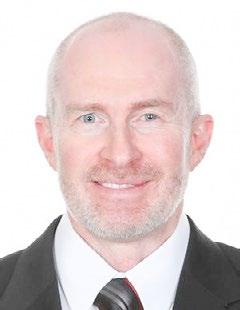
Lane has made five NCAA Division I Tournament appearances, which includes an Elite Eight run with Oklahoma in 2003, a NCAA Division II Tournament Sweet 16 run with Central Oklahoma, three NIT appearances, and multiple conference titles.
He has also coached more than 30 players who have gone on to play professionally.
Lane’s responsibilities will include scouting, team analysis and strategies and day-to-day operations within the program.
Volleyball wins against Illinois, sweeps Illinois State
BY JACINDA HALL podcast@thesunflower.com
In two back-to-back games in Illinois, Wichita State volleyball beat the University of Illinois and Illinois State.
On top of winning two games in one state, Wichita State took home their first Big Ten win in 15 years and their first sweep of the season.
ILLINOIS
On Sept. 1’s game, the Shockers knocked off Illinois, earning their first Big Ten win. The final score of Friday’s game was 3-2 (25-20, 25-19, 25-19, 25-23, 15-11).
This is the first Big Ten win for the Shockers since 2008 and the first road win in Shocker volleyball history.
The Shockers scored eight out of the nine final points in the entire game with junior Natalie Foster scoring 14 kills and sophomore Emerson Wilford scoring 11 against Illinois.
During the match, the Shockers had five players scoring 10 or more kills, including junior Morgan Weber, who was one kill away from breaking an all-time career high double-double with 13 kills and 14 digs.
ILLINOIS STATE
On Sept. 2’s game, Wichita State recorded their first sweep of the season against the Redbirds with the final score being 3-0 (25-17, 25-14, 25-13).
Wichita State forced the Redbirds into eight attack errors and a .000 hitting percentage during the third set.
Senior Sophia Rohling capped the overall match with 10 kills along with Foster, Wilford and redshirt junior Morgan Stout, who all scored seven kills in the match.
Rohling also scored a careerhigh of seven digs and a .500 hitting percentage. During the match, Weber led the Shockers with 13 digs.
After a string of away games, the volleyball team will return to Wichita State. The Shockers will face off against the University of Kansas at Charles Koch Arena on Sept. 9, first serve is scheduled for 7:00 p.m.
RUNNING ON AIR
Women’s soccer club renewed and ready for in state clashes
BY MELANIE RIVERA-CORTEZ sports@thesunflower.com
Senior Rachel Cisneros has played soccer since she was 9 years old and went on to play varsity soccer in high school.
“My junior year (in high school) was COVID, that kind of messed up a lot of recruiting with colleges and I was also just kind of lazy,” Cisneros said.
Her passion spurred her to lead the women’s soccer club at Wichita State. She joined as a freshman. Since then she taken over as president and has been working on advertising the club through social media and hanging up flyers around campus.
She said the club has been growing recently, but struggled last year with getting more players.
“I think that was partly because of COVID and everyone was still coming back, but this year we have a ton of new girls,” Cisneros said.
Cross Country sweeps at JK Classic
BY MELANIE RIVERA-CORTEZ sports@thesunflower.com
Wichita State cross country ran their first meet of the season in their new home course Clapp Cross Country Course at L.W. Clapp Park. The Shockers swept the competition at the JK Classic, the women’s team scored a perfect 15 while the men scored 16.
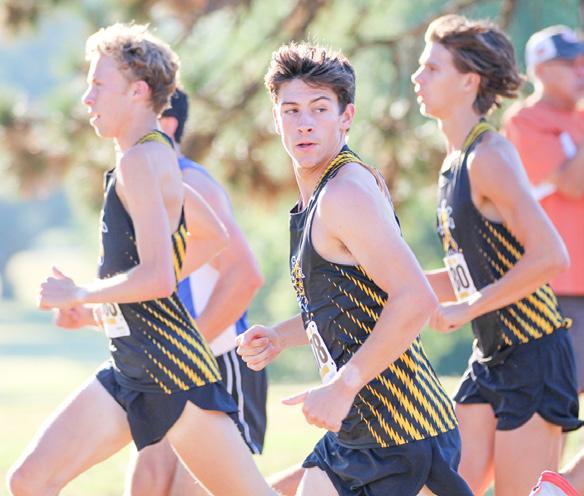
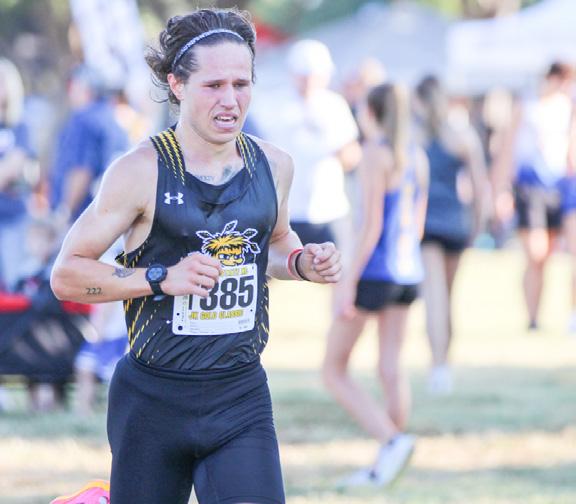
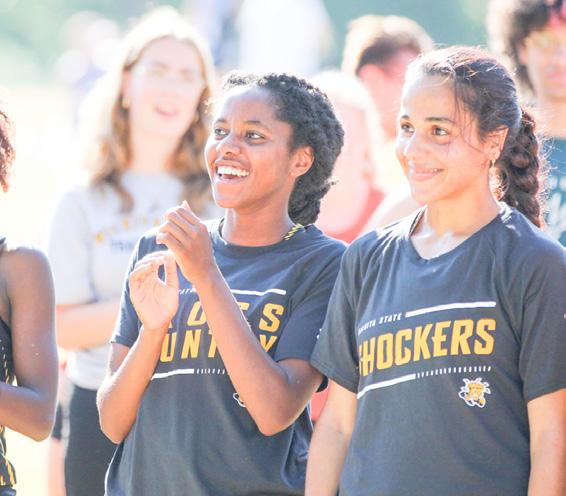
“I hope we will be a team that people pay attention to this year,” head coach Kirk Hunter said.
Wichita State competed against Emporia State, Newman University, Cowley College, Friends University and Kansas Wesleyan. The men also competed against Mid-America Christian University.
WOMEN’S 5K
Junior Lucy Ndungu smiled as he across the finish line to take first place in her debut as a Shocker, running her personal best 17:42.5.

“I’m just really happy, this is a season opener and to see how capable I am right now, I can’t wait to see midseason and end of the season what I can do,”
Ndungu said.
Hunter said Ndungu has upped her game since training in Colorado over the summer.
“It really paid off today because she looked really good,” Hunter said.
Junior Sarah Bertry took third and senior Lubna Aldulaimi came in fourth.
“I know the other girls were right behind, that made me more happy because I know like we’re all coming in together,” Ndungu said.
MEN’S 6K
Senior Iestyn Williams finished in second place for the Men’s 6K in 18:16.6; he hadn’t run in a cross country meet since he was 16. Due to injury, Williams has not been able to compete in cross country as a Shocker.
“It’s my first cross country in about six years, so I’m just really glad to be on the sideline and competing as well,” Williams said.
Hunter said Williams wasn’t sure where he’d be in cross country during a meeting earlier this season. The coach said Williams is an 800m runner but during a
training camp he ran a 10 mile escalation run.
“In (Williams’) meeting with me, about his goals (for) this fall (he) was (saying) ‘I hope I can make top seven or nine on the team,’” Hunter said. “He’s obviously gonna be one of our top guys.”
Williams said Hunter wanted the team to run together up to the 4k and after that they could take off.
“I looked around,” Williams said. “And I thought, ‘Okay, I’m in the right place.’”
At the home opener, Hunter ran newcomers unattached to protect their season and to make the decision of whether to redshirt or race them in uniform.
Junior Adam Rzentkowski took first place in the 6K, 18:09.3 but did not run in uniform.
Senior Jackson Caldwell, redshirt junior Trey Rios and junior Zander Cobb finished in the top five. Wichita State’s next run will be at the Greeno/Dirksen Invitational in Nebraska on Sept. 16. More information can be found on goshockers.com.
Men’s tennis assistant coach instills professional mindset into Wichita State
BY JACOB UNRUH jacobunruh333@gmail.com
A professional tennis player ranked inside the top thousand in the world joined the Wichita State men’s tennis coaching staff last month.
Chad Kissell, who is 994th on most recent Association of Tennis Professionals men’s singles ranking, approached the head coach Darragh Glavin during a tournament in Wichita over the summer to ask if he could become an assistant coach for the Shockers.
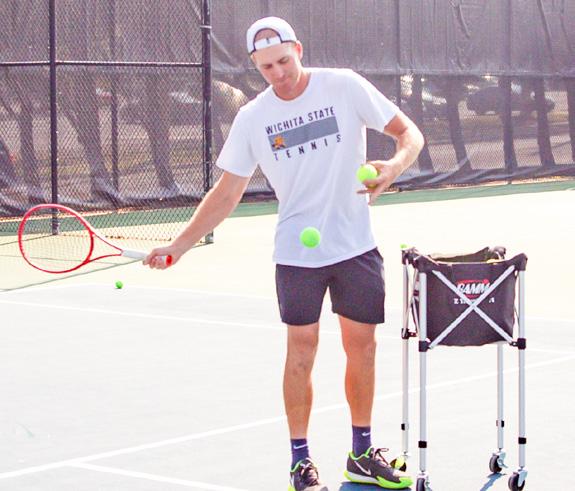
“I still play a little bit, but I don’t want it to be my main focus anymore, and I wanted to pursue coaching,” Kissell said. “And I thought, right here in Wichita would be a perfect opportunity for me, and the coach saw it that way as well.”
Kissell’s sister, Joelle Kissell, joined the Wichita State women’s tennis coaching staff last year.
Kissell said his prior knowledge of the team and professional experience have helped him hit the ground running in the new role.
“I think just having experience and knowing what a full day of training is if you want to be a professional tennis player, I can help evaluate some of the players and help give them tips and just see where they need to go,” Kissell said. “I’m still fresh, and I still feel
like I can give input and just try to help them transition from college to pro if that’s something that they want to look into.”
He said that mental toughness and motivation are the two aspects of the game that he can best teach to the team.
“You look at even the guys at the top level, a good win percentage is 60%,” Kissell said. “You have to get used to the feeling of losing, because it’s impossible to win every single match … I think that if you can accept that failure comes, and you’re not going to let failure dictate the way you work on and off the court, you’re going to achieve far greater things.”
Kissell said that he will still compete in professional tournaments in the summer and fall, but wants to start transitioning away from playing and more towards coaching.
“I thought, why not try to still play a little bit but also get my career moving forward,” Kissell said.
Despite winding down his playing career, Kissell believes that the new perspective of coaching will also help him achieve more competitive success.
“I’m analyzing the game a lot more than I ever had, just watching the guys seeing what they
can do,” Kissell said. “I think now when I go into matches, it’s like no matter what position I’m in, I kind of just know the second you get down on yourself, you’re just going to crumble. So regardless of the circumstance, just trying to always stay positive and have a killer mindset.”
The coach thinks that the Shockers should compete for conference tournaments and can be ranked in the top 50 in the nation by the end of the year.
“I think Wichita is a good setup for tennis,” Kissell said. “The climate is good here, and we have a lot of good players on the team already.”
The Wichita State men’s tennis team opens their season on Sept. 9 with the ITA Tour: Fall Circuit at the Coleman Tennis Complex in Wichita.
She said that the club has been working on getting a sponsorship with Scheels to get equipment like balls and jerseys.
Cisneros said there are no tryouts for the club but anyone can show up at practices.
“When we play in games it helps to have experience but it’s not really that important to win,” Cisneros said. “It’s more about having fun.”
The club will have four games this season: home and away series with Kansas State and the University of Kansas. They competed against Creighton University and University of NebraskaLincoln last season but those teams switched leagues.
“We want to play more games, but we need more people in our league, but they’re just like normal games, we travel or they come here,” Cisneros said.
Cisneros said that the games are standard regular soccer games with 90 minutes and two halves.
“They are just normal games, we travel or they come here, full field. full time, 11 (versus) 11,” Cisneros said.
Megan Brandley is the vice president of the club, she began participating in sports when she was a little girl because her brothers used to play a multitude of sports, including soccer.
“I just kind of fell in love with it, and eventually I quit all other sports and just focused on that one,” Brandley said.
She said joining the club has been a lot of fun and there are a lot of benefits to joining.
“It’s a good way to meet people throughout campus, make some connections, stay active, play a sport you might have used to love and you want to get back into it or try something new,” Brandley said.
Brandley said that they welcome all skill levels.
“Just come out to practice, see it, try it out, you don’t have to practice,” Cisneros said. “It just takes that one first step, just come out and have fun.”
The women’s soccer club practices Tuesday and Thursday at Metroplex Field 3 on the corner of Oliver and 29th.
More information for the club can be found on their instagram @wichitastate. womenssoccer.
SPORTS Sept. 7, 2023 | 3 www.thesunflower.com HAVE A STORY IDEA? Contact the Sports editor,
Melanie Rivera-Cortez sports@thesunflower.com LANE
Lucy Ndungu, newcomer and one of Wichita State’s top runners comes across the finish line. Ndungu finished in first place with a time of 17:42.5 in the 5k. | Photos by Cheyanne Tull / The Sunflower
The top three finishers stand to be recognized at the JK Gold Classic meet. Pictured is junior Sarah Bertry and senior Lubna Aldulaimi.
Wichita State senior Iestyn Williams runs at the JK Gold Classic meet on Sept. 2. Williams ran a time of 18:16.6
The men’s cross country team begins their race at the JK Gold Classic on the new course. The men placed first overall in team scoring of the 6k
Chad Kissell, the new assistant tennis coach, feeding balls. | Photo by Lee Frank / The Sunflower
ARTS & CULTURE
LIGHTING IT UP
Wichita Students get funky in the middle of the dancefloor, dancing to classic hits played for Bollywood Night on Sept. 2. | Photo by Melissa Espinoza / The Sunflower

Bollywood party showcases Indian music, dance
BY MEL BRIGHT amiyahmeldy@gmail.com
Vibrant music and lighting met students who attended Bollywood Night at the Rhatigan Student Center Saturday evening. The Association of Hindu Students in America (AHINSA) hosted the dance event to feature Bollywood music and Indian culture.
Kavi Shahi, president of AHINSA, said that his team planned the night to highlight the best of Bollywood.
“Not only is there Bollywood music, but there’s music from all of the film industries that use Bollywood music for films, and there’s also many popular songs from all around India,” he said.
The event was more than an opportunity for students to learn more about Bollywood culture.
Freshman Vamsi Krishna said that it is important to have Indian representation on campus.
“These past three or four years, you see students from all around India, mostly southern India,” Krishna said.“So with these kinds of events, if you aren’t interested in representing people like this, then no one is going to want to come.”
Many party-goers were familiar with the songs that were played. Krishna took the event as an opportunity to put his love for Indian dance on display.
“Lucky for me, it’s in my blood,” Krishna said. “I grew up dancing and being on YouTube for dancing in India. Dancing is a wonderful way to clear the mind.”
Glow Party invites students to night of sharks, color
BY MEL BRIGHT amiyahmeldy@gmail.com
In a dimmed version of the Rhatigan Student Center, students gathered for a night of glow-in-the-dark antics.
Attendees of Wichita State’s Glow Party on Thursday evening enjoyed a DJ, glow sticks and refreshments.
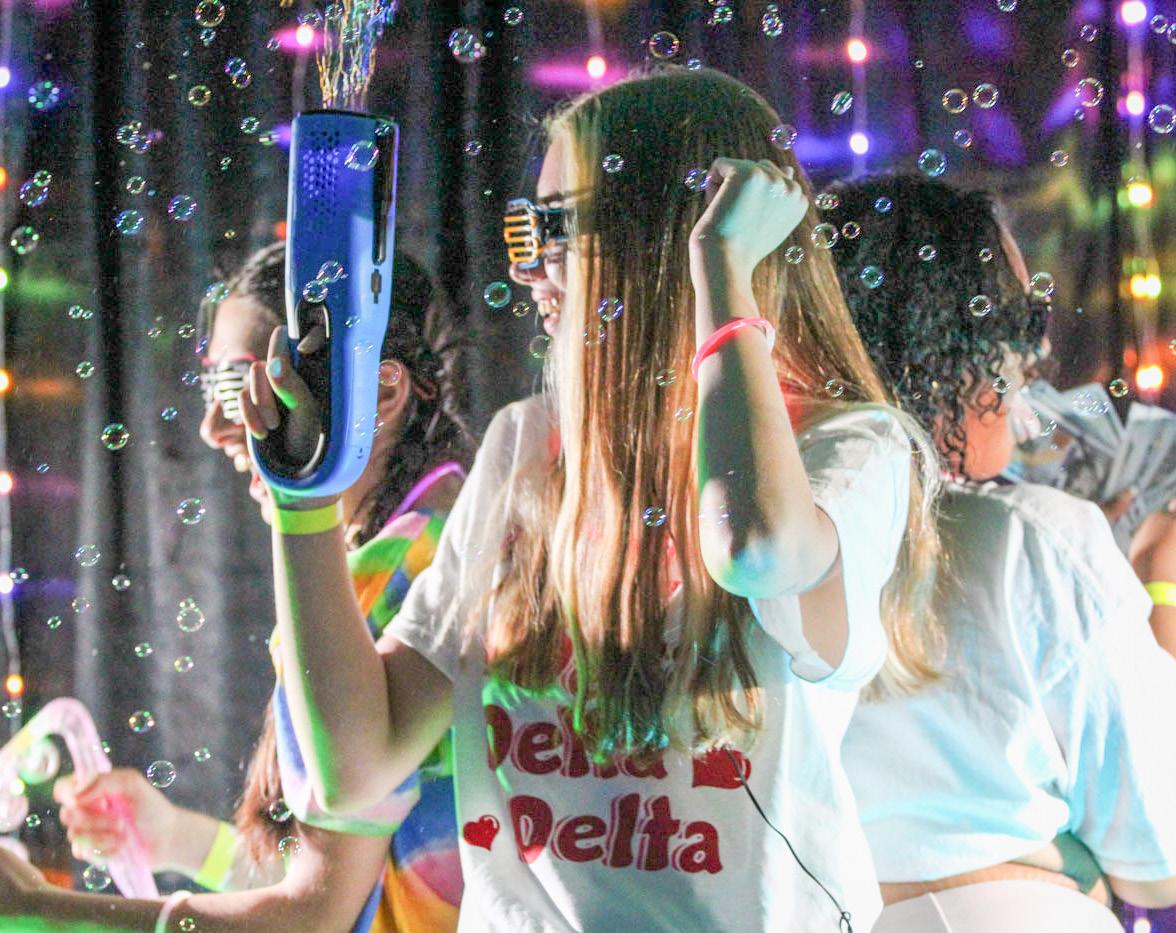
Despite worries, the glow party was packed with students. The event staff dressed as sharks at the beginning of the party and
encouraged students to get on the dance floor.
Payton Hamilton said that planning the event had its challenges. On the Student Activities Council, Hamilton served as the freshman representative on the digital content creation team.
“I know that there was a lot of stress about how it would turn out,” Hamilton said. “Especially since the Glow Party happened last year, I know it was a bit of a challenge to (match) that.”
Social justice talk at Ulrich highlights empowerment of youth
BY GENESIS MERRIETT enserudition@gmail.com
“We have too many conversations about the future — without the future at the table,” Marquetta Atkins-Woods, mentor and the founder youth program at Camp Destination Innovation, said during a “social justice talk” at the Ulrich Museum of Art.

Atkins-Woods discussed the involvement of young people in social justice and the burden placed onto future generations.
“You shouldn’t have to carry this mess that’s not yours,” AtkinsWoods said. “So my drive is, at some point, we have to stop passing on things that are harmful to the next generation.”
Ksenya Gurshtein, modern and contemporary art curator for the museum, highlighted the
importance of looking to history to work through social justice topics.
“To me, it made a lot of sense that if we’re going to look at historical figures who were really invested you know, very personally, fighting for social justice, that we should look at what’s happening here and now and be a platform and a way of connecting people to what’s happening here and now,” Gurshtein said.
Atkins-Woods explained that it was important for this talk to be held in the Ulrich Museum.
“Young people are just inspired by the work, and so you know, art and social justice are married, they go hand-in-hand,” Atkins-Woods said.
According to Atkins-Woods, young people are the key to political change.
“I could have went a thousand different directions, but making sure
that I kept that centered around young people, because when you think about any great thing that happened in the world, youth are a catalyst,” she said.
Although Atkins-Woods focused on mentoring youth, she also ensured that adults were held accountable through policy, investment, and even creating a healthy environment at home.
“I’m a firm believer that the most powerful community and social justice work starts at home,” Atkins-Woods said. “So if you’re doing something in your home that’s harmful, that you shift it so that you create a healthy environment.”
Jay Wyrick, a sophomore art education major, appreciated the talk’s focus on equality, burnout and community.
“It’s made me realize I have power to just be my own self,” she said.
Hamilton helped market this event and other Student Activities Council (SAC) events by making posters as well as taking film and video to post on SAC’s social media.
The glow party gave students the opportunity to meet classmates outside of an academic setting. Joy Glover, a freshman studying interior architecture, said that she was there for that exact reason.
“I saw this party on WSU’s
Instagram, and I thought it would be fun,” Glover said. “I’m here to make some friends, and the vibes are good.”
There was also an area where students could take photos and videos with their friends with photo booth accessories. Yolanda Martinez, a freshman studying health science, arrived early to the event.
“It’s my first year, I’m paying for these classes, so I’m going to have some fun,” Martinez said.
‘Emotion transcends language’: Ulrich museum exhibit features stories from refugee families
BY MALEAH EVANS maleah.evans04@gmail.com
The Ulrich Museum of Art recently curated an exhibit to spotlight the experiences of refugee families in Wichita, shedding light on the challenges they faced and what brought them to the United States.
The Ulrich opened “Where We Belong” on Aug. 24 as a collaboration between the Ulrich and Center for Educational Technologies to Assist Refugee Learners, a research center led by Mythili Menon on Wichita State’s campus.
The families interviewed for the exhibit came from Afghanistan, the Democratic Republic of the Congo, Syria, Ukraine and Venezuela.
All were forcibly displaced from their homes due to war, economic insecurities and other violent conflict.
“Even though we have the language barrier, all these stories are so powerful … and moving because they’ve never had the opportunity to tell these stories before,” Menon said. “No one has (ever) sat with them and asked ‘Tell your story in your language,’ so there were a lot of tears.”
The Center for Educational Technologies to Assist Refugee Learners (CETARL) primarily assists refugee and asylee students as they adapt to a new learning environment, through their project “Education for All.” Their goal is to create an
MYTHILI MENON Assistant professor of english and linguistics and director of linguistics
environment through which the specific needs of refugee students are met.
“What we are doing with Project Education for All is to create a bilingual digital game based learning platform … called Gorilla Bay,” Menon said. “We have four different modules in it … the solar system, the human body, habitats and ecosystems, and physics … based on middle school science curriculum.”
A demo of Gorilla Bay is currently available in the exhibit, and it is playable in several different languages.
“We wanted to give them a place to tell their stories in their own language, give them a voice because a lot of their voice has been silenced for a number of years,” Menon said. “We don’t hear about the socio-cultural aspects of the community, we don’t hear about the festivals in the community … We thought a museum was the best space for that to have the greater Wichita public interact with them (the families).”
“Where We Belong” will be open in the Ulrich until Dec. 7.
4 | Sept. 7, 2023 www.thesunflower.com HAVE A STORY IDEA? Contact the Arts editor, Salsabila Attaria arts@thesunflower.com
Freshman Kylie LeValley, who is on the pre-med track, poses with her friends at the photo booth. The bubbles were a popular feature in many people’s photos. | Photos by Cheyanne Tull / The Sunflower
Marquetta Atkins-Woods, social justice advocate, introduces her programs that teach youth in the community. AtkinsWood visited the Ulrich Museum of Art for the “Social Justice in Our Community” talk on Sept. 5.
| Photo by Mel Bright / The Sunflower
“
We wanted to give them a place to tell their own stories in their own language.
‘ON THE STREETS’
Hostile architecture is the perfect way to ostracize homeless people
BY LOREN AMELUNKE loren.amelunke@outlook.com
As more and more of our people are being forced to survive on the streets, America is fighting back – just not in the way one would hope.
The U.S. Housing and Urban Development’s information site, the HUD Exchange, reports in the Annual Homelessness Assessment that on any given night in 2022, approximately 582,500 people were struggling with homelessness. Of those 582,500 people, only 60% were able to find a shelter or housing program while the other 40% were stuck living on the streets.
But homeless people cannot live on the streets, either. Cities like San Francisco, Los Angeles, New York, and even Wichita, are purposefully making public sidewalks and streets inhospitable by implementing hostile architecture. From an urban design perspective, hostile architecture is meant to deter activity that could
harm the people walking by or the surrounding businesses. Unfortunately, this architecture is also used to discriminate against homeless people while passing as something helpful to the rest of the community – the people America feels like helping.
One example of hostile architecture, the Camden Bench, makes anything but sitting impossible. As a massive slab of concrete, it purposefully has no crevices for people of the city to stash drugs or litter and is slanted to “discourage skating.” Conveniently, it is also impossible to sleep on.
Some of these anti-homeless designs are more obvious, such as street spikes, while objects like planters can be disguised as adding a nice touch of green to a gray city. In reality, sometimes the purpose of planters is to split up the sidewalk into a safe, walkable area, and push homeless people closer to the cars in the street. Even more horrible and inhumane designs such as fences around vents are there to restrict
people from keeping warm.
This sends the message that homeless people doing their best to survive with very little are creating a bad image for the city. We could be doing much more to help these people rather than trying an “out of sight, out of mind” approach to not make it our problem. Regardless of one’s socioeconomic status, everyone deserves a roof over their head.
Many of us do not acknowledge the luxury of sleeping in our own bed in a private home. Imagine how it would feel to sleep on the ground in public where anyone could stare at you. That is 582,500 people’s only option – and we’re taking that away, too.
Hypothetically, if a person who is well-dressed falls asleep on a park bench, how do you think the public would react? They would either be left alone or maybe someone would stop to make sure they’re okay. Homeless people, however, are not regarded with the same respect and human decency.
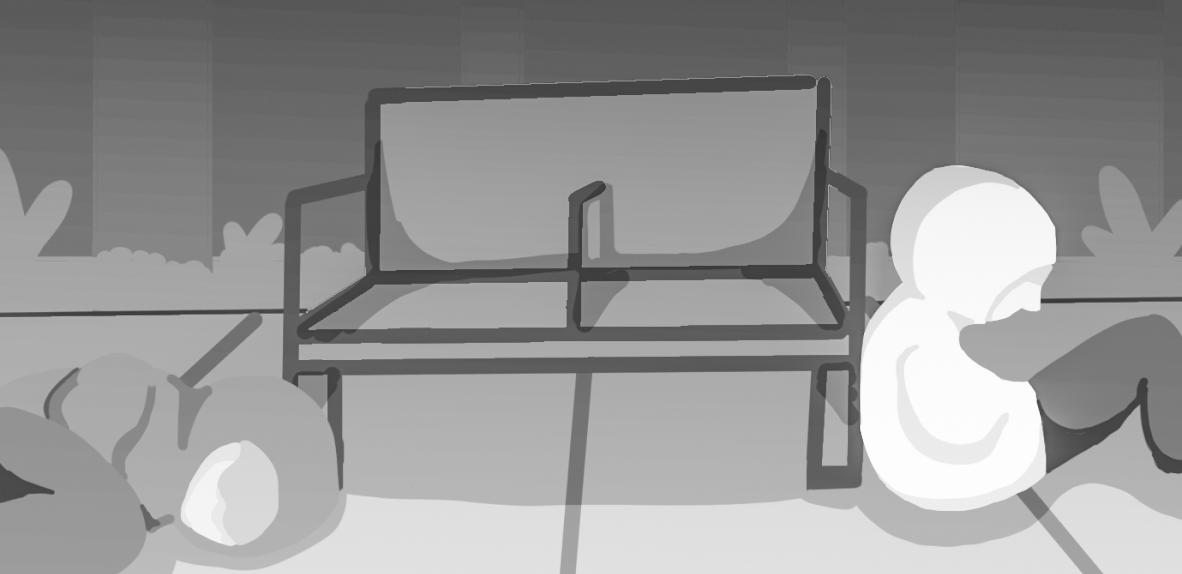
LETTER TO THE EDITOR
Student Government corruption impacts you
BY VISHNU AVVA vcavva@outlook.com
After the Student Government elections this year, I applied to join the Okere Administration as Legislative and Policy Director. I had previously interned for Governor Laura Kelly, a state Representative, a State Senator, and a campaign in Washington DC lined up for the summer.
To say I was experienced was beyond true. After weeks of waiting with no response, I would find out that President Okere appointed another individual to this position. While understanding that the position was open and not guaranteed to me, it appears they were promised to other individuals.
Six Okere appointees did not apply for their position but were still appointed/confirmed. Further, many actual applicants, including myself, did not receive basic interviews for these positions.
The SGA constitution requires the President to make appointments based on the applications received and interviews conducted. How can we believe that the President made the best choices or didn’t already promise these positions to people if she refused to interview everyone? But what does this mean for you, the student?
It is unmistakable that students are being served by individuals who are not the most qualified for their positions. Students in need will suffer this year because of this blatant cronyism. Further, these corrupt nominees will cost the student body approximately $60,000 in wages, plus thousands more in discretionary spending.
The Student Senate and Student Fees Committee debated and rejected funding increases to the Office of Diversity and Inclusion and The Sunflower. Money that funds
student programming and wage increases for student employees. Instead, your hard-earned money is now funding friends in high places.
It’s evident that SGA deserves further scrutinization by the student body. Wichita State should have a president who wants the best for the student body and has a solid plan to implement.
People who take a good look at our current SGA would be embarrassed by its current state.
I genuinely believe that SGA could be a trusted organization that people want to be a part of. I want it to be a place where if someone had a problem, they’d go to their senator because they know their issue will be addressed. If the current SGA can look within itself and hold its leaders accountable for their transgressions, I know it could be something everyone can be proud of.
The existence of anti-homeless architecture reflects how America views homeless people in a negative lens and exposes how homelessness continues to be a large issue that is brushed to the side.
It is obvious; we have an implicit bias towards homeless people. If we create the narrative in our minds that these people are scary, unapproachable, drug addicts, erratic, dirty, or criminals, or that maybe if they just got a job and contributed to society like the rest of us they wouldn’t be in this situation, we make it easy on ourselves to retreat to our comfortable lives and not help. With this mindset, why would anyone in their right mind want to help someone like that?

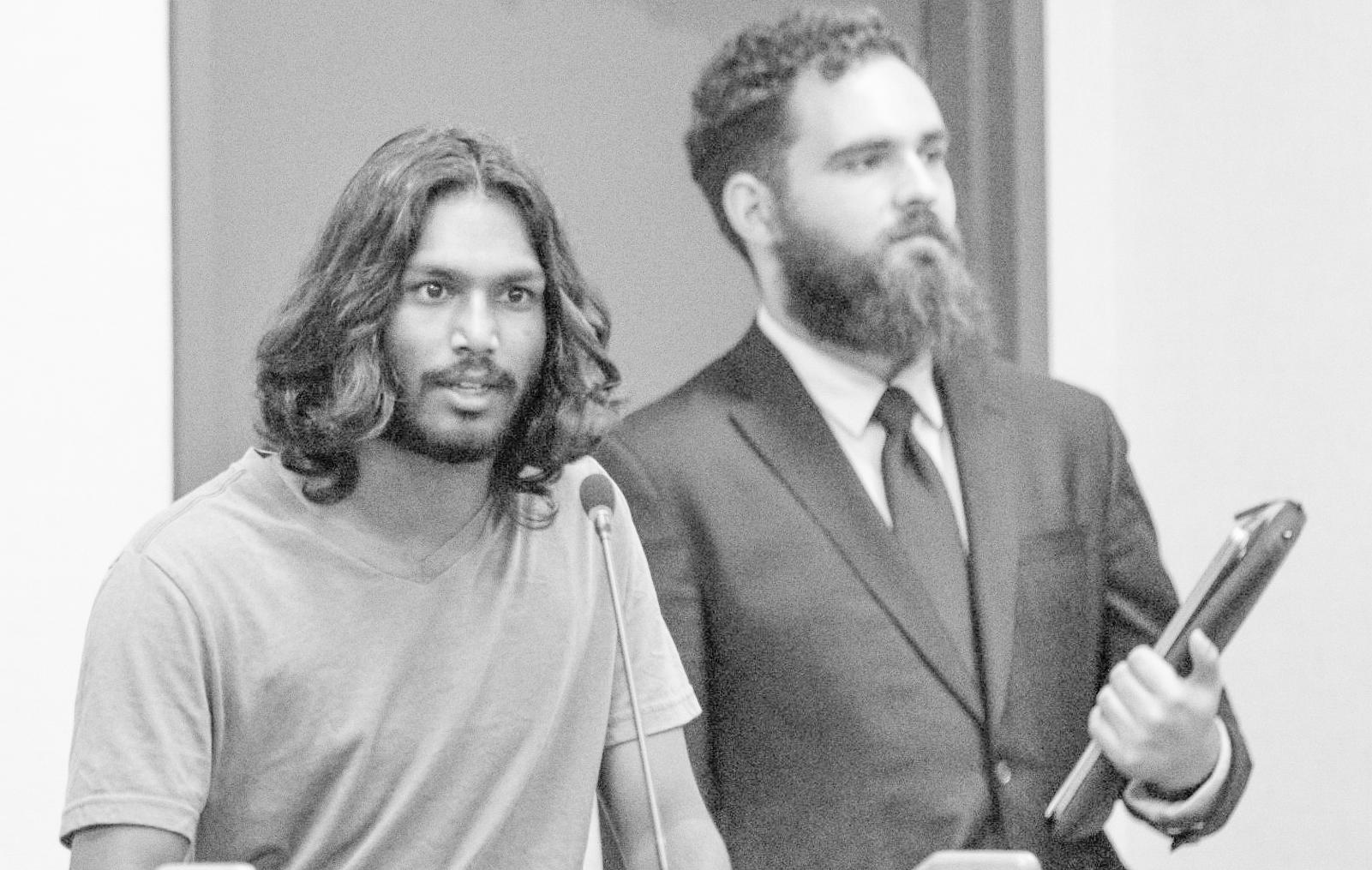
We devalue homeless people to try to make this huge problem smaller and force it out of view. In 2015, San Francisco introduced hydrophobic, UV-treated paint. It has been called “pee-proof” paint, as the goal is to cut down on public urination by making it so that your urine bounces back
onto you. It is understandable to discourage public urination for hygienic reasons, but it is not the fault of a homeless person. Homeless people would like a clean place to live just like the rest of us, but what other choice have we given them? Oftentimes, public bathrooms are closed at certain hours specifically so homeless people cannot take shelter there nor relieve themselves. Other restrooms are reserved only for customers. We’re causing the problem, and then blaming the victims for the ways they have to fight to survive it. Hostile architecture does not address the crisis of homelessness, it only further builds a negative reputation for homeless people as they find worse ways to cope. These people have nowhere else to live. We either need to give them a better place to live or at the very least, let them live on the streets in peace. If you fell on the hardest of times, wouldn’t you want the same?
WSU food robots should only be used in circumstance
Tyler Guthrie tylereguthrie2022@gmail.com
This year, Wichita State has many little six-wheel robots rolling around campus. They’re for people who would like their food brought to them. I see that this can work well but not without fallacies.
Someone cannot simply walk up to a robot, open its top and take out what’s inside. (I tried to do that when I came across two of them.) The customer has to order their food through the Starship Technologies Food Delivery app.
The app is simple yet expertly executed. First, the customer must set a location to meet the robot at. The app allows the customer to choose a spot along any walkway on campus. Second is a plethora of options from Freddy’s, Panda Express, The Market at Groundhouse, Starbucks, Tu Taco, Black and Gold To Go and Cargill Café. They select their meal and checkout with an additional reasonably priced $2.49 delivery fee. Finally, you select a location and meet up.
THE DOWNSIDE OF THE ROBOTS
The biggest misfortune of this system is a robot will not arrive for about 25 to 45 minutes, depending from which establishment the customer ordered from. Of course, it makes sense: the meal has to be
prepped, put in a robot, then issued to the meetup spot.
This problem solely lies on the robots traveling 3.7 mph, just slightly above walking speed. Since they travel all over campus, it makes sense they wouldn’t go too fast. But I feel they can, and should, feasibly travel faster than 3.7 mph to make the system worth it. Perhaps they can be set to jogging speed (about 5-7 mph) and above, but not over 10 mph to ensure safety.
I feel this could work, because from what I’ve observed, when something suddenly enters a robot’s path, it brakes and stops in place. If they were to go around 7 mph, they will travel with more conserved time. Also, if someone accidentally steps in front of one, the robot will still throw on its brake and stop just as quickly as at 3.7 mph.

The long wait means there’s only one reasonable option, so you don’t waste money and time: order a meal and set the location about 30 minutes before a class or event ends, so when the customer leaves, they will be guaranteed their meal immediately instead of having to walk a little distance.
For everyone else, just go to Shocker Hall, RSC or Braeburn Square to eat, and save yourself the $2.49.
OPINION Sept. 7, 2023 | 5 www.thesunflower.com HAVE A STORY IDEA? Contact the Opinion editor, Sascha Harvey opinion@thesunflower.com
Illustration by Haylee Coolen / The Sunflower
OPINION
Vishnu Avva, member of Model UN, speaks to the Student Senate on Aug. 23. | Photo by Mia Hennen / The Sunflower
VIBRANT VIBES
The Association of Hindu Students in America hosted Bollywood Night, featuring popular music and culture from India.



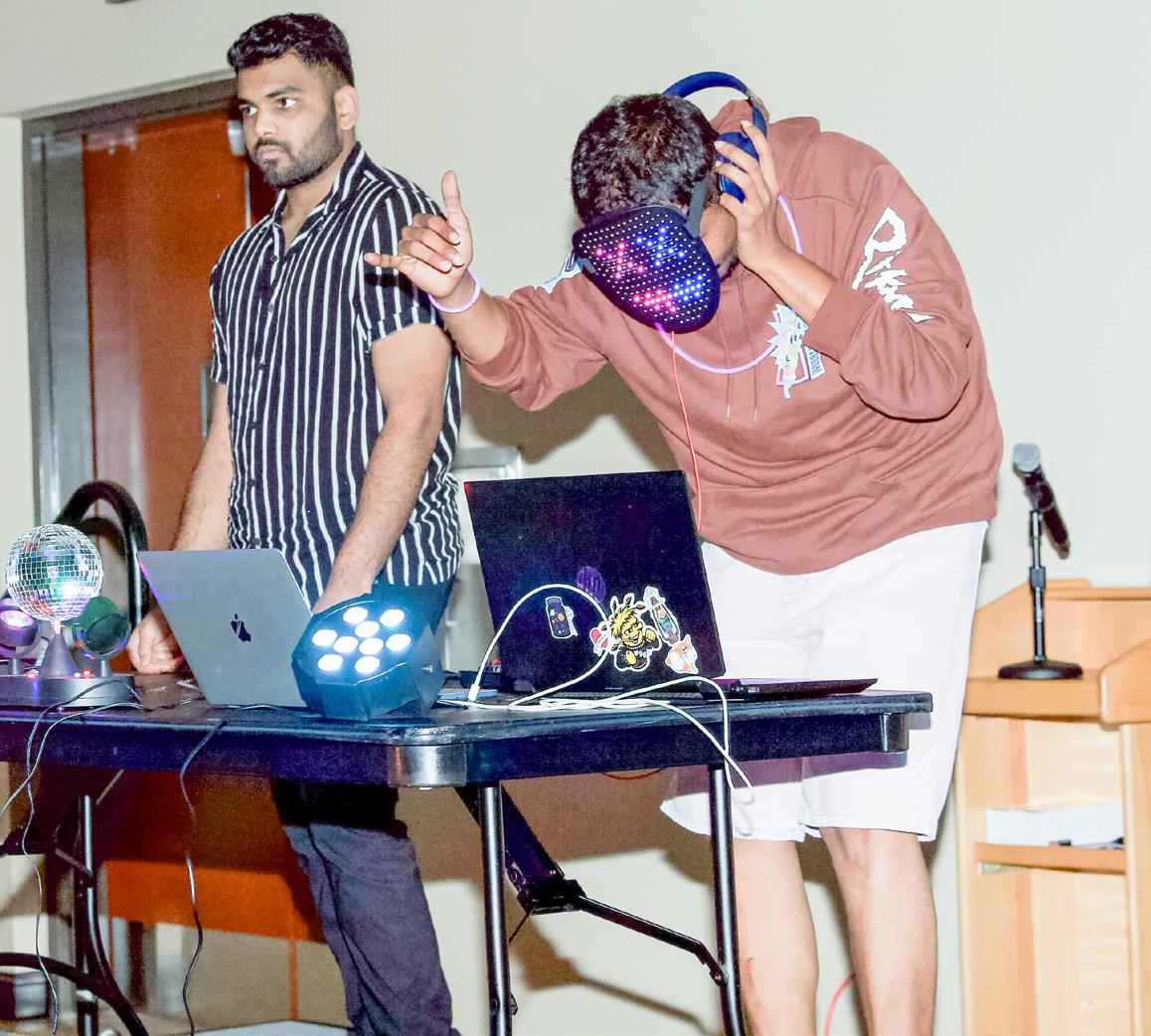
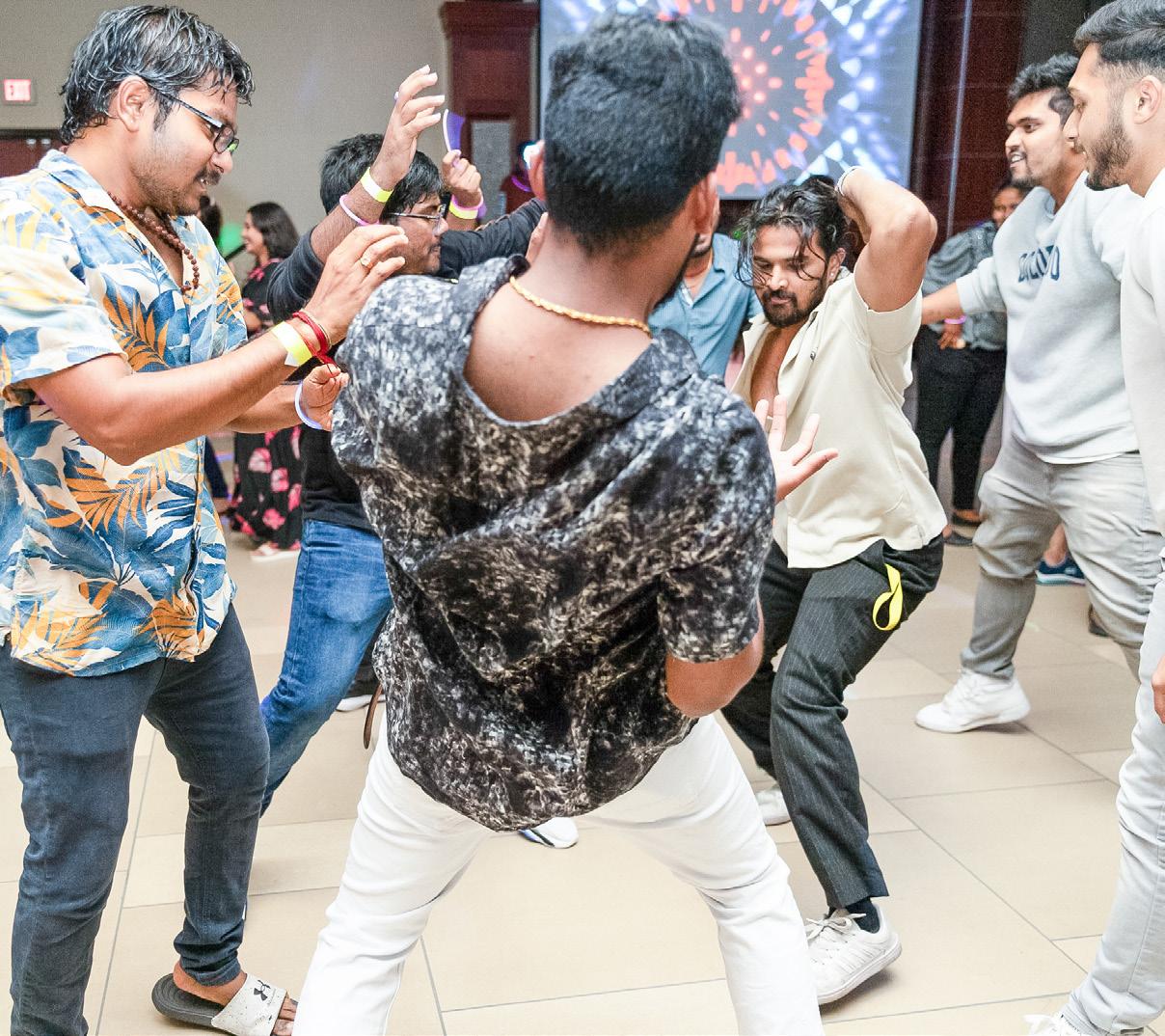

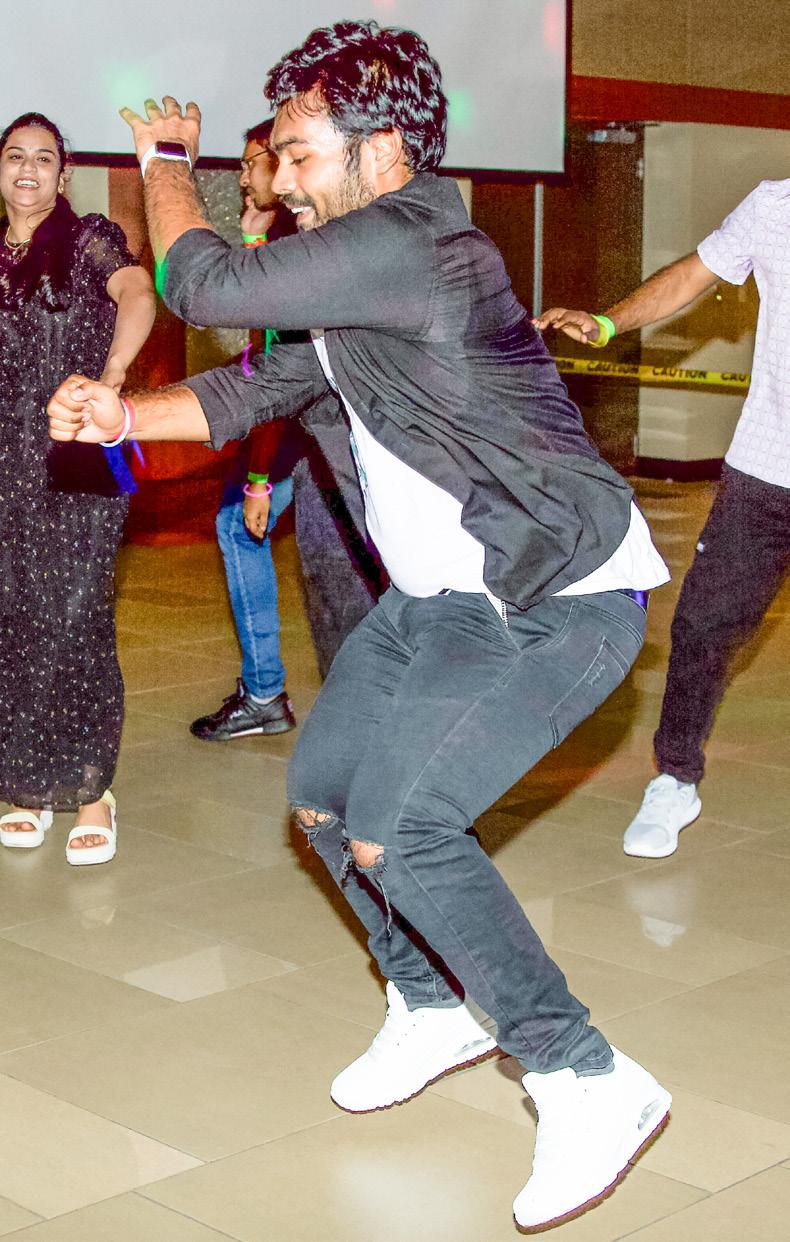

UPCOMING EVENTS
ONE SMALL STEP CONVERSATION SESSIONS
THURSDAY, SEPT. 7
9 a.m. - 5 p.m. | Ulrich Museum
STUDENT ENGAGEMENT, ADVOCACY & LEADERSHIP (SEAL) OPEN HOUSE
THURSDAY, SEPT. 7
10 a.m. - 2 p.m. | Rhatigan Student Center
SGA WEEK: I SCREAM, YOU SCREAM, WE ALL SCREAM FOR ICE CREAM
THURSDAY, SEPT. 7
Noon - 2 p.m. | Rhatigan Student Center
UPSTREAM: CULTURAL COMPETENCE AND HUMILITY TRAINING
THURSDAY, SEPT. 7
1 - 4 p.m. | Hughes Metropolitan Complex
COMMUNITY SERVICE BOARD GENERAL MEETINGS
THURSDAY, SEPT. 7
3:30 - 5 p.m. | Rhatigan Student Center
PHILOSOPHY COLLOQUIUM: ‘CONSIDERATIONS ON LOYALTY’ WITH DRS. DAVID AND DEBORAH SOLES
THURSDAY, SEPT. 7
3:30 - 5 p.m. | Rhatigan Student Center
WORDS BY WOMEN LECTURE
SERIES: DR. AMRITA MYERS - ‘JULIA CHINN: A STORY OF SEX, SLAVERY, AND SURVIVAL IN THE OLD SOUTH’
THURSDAY, SEPT. 7
6 - 7:30 p.m. | Ahlberg Hall
ONE SMALL STEP CONVERSATION SESSIONS
FRIDAY, SEPT. 8
9 a.m. - 5 p.m. | Ulrich Museum
SGA WEEK: FOOD TRUCK
FRIDAY
FRIDAY, SEPT. 8
11:30 a.m. - 2 p.m. | Shocker Hall
TEACHING MATTERS SERIES: CREATING CONNECTIONS WITH AND AMONG YOUR STUDENTS
FRIDAY, SEPT. 8
Noon - 1 p.m. | Rhatigan Student Center
WICHITA CLEAN STREAMS
SATURDAY, SEPT. 9
10 a.m. - Noon | Off-campus
ONE SMALL STEP CONVERSATION SESSION
SATURDAY, SEPT. 9
11 a.m. - 5 p.m. | Ulrich Museum
EMPTY BOWLS: COMMUNITY
BUILD-A-BOWL
SATURDAY, SEPT. 9
1 - 3 p.m. | Henrion Hall
BIOLOGICAL SCIENCES
SEMINAR SERIES: DR. TATSUYA YAMADA
MONDAY, SEPT. 11 4 - 5 p.m. | Hubbard Hall
MONTHLY MONDAY TRIVIA
MONDAY, SEPT. 11
5:30 - 6:30 p.m. | Rhatigan Student Center
ULTIMATE FRISBEE ON CAMPUS!
MONDAY, SEPT. 11
6:30 - 8 p.m. | Charles Koch Arena
ALTERNATIVE SPRING BREAK
MEETING
TUESDAY, SEPT. 12
Noon - 1 p.m. | Rhatigan Student Center
HAVE AN EVENT YOU WOULD LIKE LISTED?
CONTACT THE ARTS EDITOR: arts@thesunflower.com
CONTACT THE NEWS EDITOR: news@thesunflower.com

6 | Sept. 7, 2023 www.thesunflower.com ARTS & CULTURE
Two students embrace on the dance floor at Bollywood Night. The event was held by the Association of Hindu Students In America on Sept. 2. |
Photo by Melissa Espinoza / The Sunflower
As popular Indian music blares through the Beggs Ballroom, two attendees move together to the music.|
Photo by Melissa Espinoza / The Sunflower
Wichita State student get funky in the middle of the dance floor, dancing to classic hits played for Bollywood Night on Sept. 2. | Photo by Melissa Espinoza / The Sunflower
A group of students dance together at the Bollywood Night event. | Photo by Monique Bever / The Sunflower
Shanthan Garrepelli and Shubham Aggarwal select songs for members of the Association of Hindu Students In America to dance to at Bollywood Night. | Photo by Melissa Espinoza / The Sunflower
A student dances to Indian songs at Bollywood Night. | Photo by Monique Bever / The Sunflower
A student dances while a friend records and takes pictures at Bollywood Night. | Photo by Melissa Espinoza / The Sunflower Students participate in a group dance during Bollywood Night. |
Photo by Monique Bever / The Sunflower
 BY COURTNEY BROWN newsprojects@thesunflower.com
BY COURTNEY BROWN newsprojects@thesunflower.com



 BY TRINITY RAMM managing@thesunflower.com
BY TRINITY RAMM managing@thesunflower.com

























